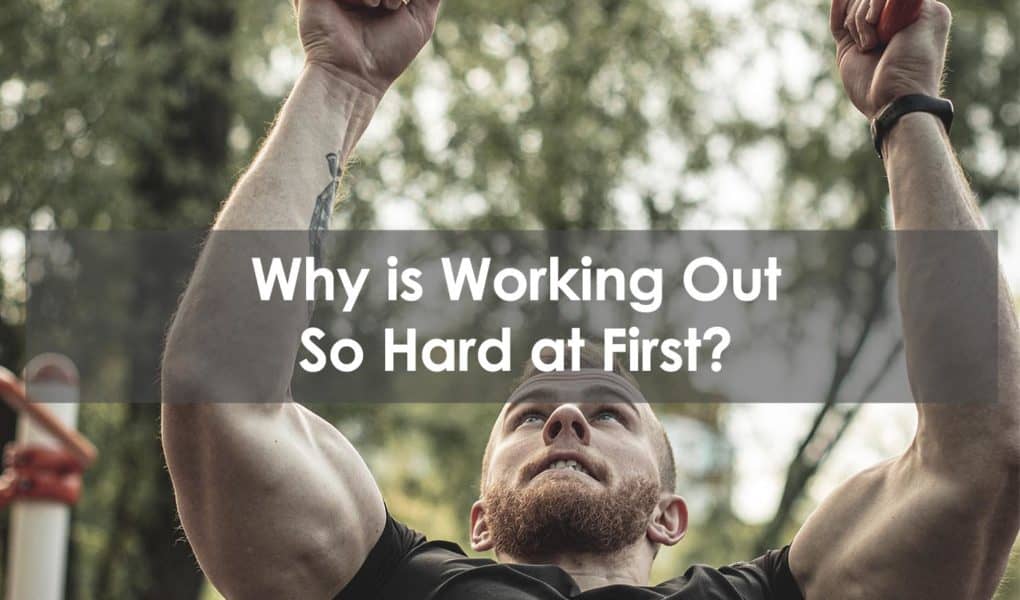The first time you start working out with weights, you are going to be in for a pretty traumatic time. While it won’t feel too bad while you are actually doing the exercises, just wait for the day after. You will be feeling pain in muscles that you didn’t even know you had. Most often, though muscular pain is felt in the crook of the elbow (don’t be surprised if you can’t straighten your arm) and in the thighs so that walking up a flight of stairs becomes out of the question. In this article, I will uncover the 5 main reasons that working out is so hard at first.
New Muscular Stress

If you have never seriously worked out before, the muscles of your body will be used to a certain level of stress. But when you begin weight lifting, that stress level is dramatically ratcheted up. The chronic stress on your muscles will actually cause micro-tears to occur within your muscle fibers. This will cause sore muscles, which usually are centered around the point where the muscle connects to the bone, such as the elbow joint.
Your first few strength training sessions hit your body like a shock wave. It will think that an emergency is taking place and go into fight or flight mode. As a result, your body will release hormones, speed up blood supply to the affected muscles, and fast-track nutrients and oxygen to the trained muscle parts. You will also experience a build-up of lactic acid and waste products, both of which your body is not used to.
All of these things will cause physical pain to your muscles. To help offset the pain and allow for muscle repair, give your body 48 hours rest between sessions to achieve actual muscle recovery and increase lean muscle mass.
You are Unconditioned

When you go from an untrained state into regular exercise sessions, it will take quite some time for your body to get into training condition. You will be lacking in both strength and endurance levels. As a result, you will quickly lose strength and energy as you start training. When you start doing some aerobic portion of your workout routine, you’ll quickly run out of puff as your heart rate goes through the roof.
In order to ease the impact of not being conditioned when you first start working out, be sure to ease into your new workout plan slowly and progressively. Do not push yourself beyond what your body can handle at the time. Resist the temptation to show off by lifting a weight that is beyond your current capability. Use lighter weights and gradually add to them a pound or two every couple of weeks. This will allow your muscles to adjust to the new level of stress that you are imposing on them.
Be sure also, to get into the habit of warming up before your exercise routine. This will help to ease your body from a sedentary into a trained state. Start with a few minutes of light cardio on a treadmill or with a jump rope. Then do some dynamic stretching where you are moving a muscle through its full range of movement. Leave static stretching until after the workout as part of your warm-down routine.
Lack of Mental Strength

Working out is about more than simply moving the muscles of your body. The mind plays a huge role. Unless you are fully tuned in mentally, you will struggle with your workouts. The problem with many people is that they view their workouts as a chore – a necessary evil that they must endure to get to their goal of a better body.
That sort of negative mindset will feed the impression that your workouts are hard, arduous obstacles that you have to climb. That is not the mindset of a winner. You need to avoid this type of thinking and learn to actually enjoy the journey. Come to appreciate the immediate benefits of your exercise program – how it makes you feel great due to the release of feel-good endorphins, and how it is a display of your determination, discipline, and mastery over your body.
For most people, the mind gives up before the body does. By learning to enjoy the workout program journey, you will be able to develop the mental toughness to push your workout session to the limit. Your workouts will be the most fun, exciting and challenging part of your day.
Wrong Goals
If the goal you are focusing on is to lose 50 pounds or pack on 20 pounds of muscle, you will struggle on a day-to-day level. That is because the goal is too big – it is hard to make the connection between doing an extra two reps on your set of curls and gaining an extra 20 pounds.
While it is great to have a large goal, like gaining 20 pounds of muscle in a year, you should then go a step further and break that big goal down into stepping stone goals that are achievable on a day-to-day level. By focusing exclusively on that daily goal, you will be ensuring that the big goal takes care of itself.
Your day-to-day goals should revolve around your workout for that day. Analyze your last workout performance and set goals for improvement. So, if you got 7 reps on your last set of chest presses last time, make it your goal to press out 8 perfect reps. Set 3 or 4 of these mini-goals and be actually zoned in on them as you go into the workout.
When you have these mini-goals as you walk into the gym, you will be completely tuned in to the workout. You’ll be amped up and determined to make this workout your best workout ever!
It’s Not Habitual
It takes time to build a habit. During the time that that process is evolving, you need to daily summon up a huge dose of discipline and motivation to get to the gym. That is hard going. The key, though, is to persevere through this period. After a month or so, you will have advanced beyond the hump and your workout habits will become habitual for you.
Conclusion
You won’t be able to completely eliminate the hardness of working out at first. By applying the suggestions provided here, however, you will be able to minimize that physical and mental hardness while maximizing your workout routine results.
Frequently Asked Questions
How long does it take for my muscles to stop hurting after a workout?
You will always experience a degree of post-workout muscle soreness. However, when you start training for the first time, it will be a lot more intense than at other times. This is a result of the initial shock of the training stress. So long as you continue to train consistently with a smart workout plan, this intense pain will be gone after about two weeks.







